Quarantine Diary: Life in a Gaza isolation center
In the second installment of personal stories on the pandemic's impact, a student shares her experience from a quarantine facility in Gaza.
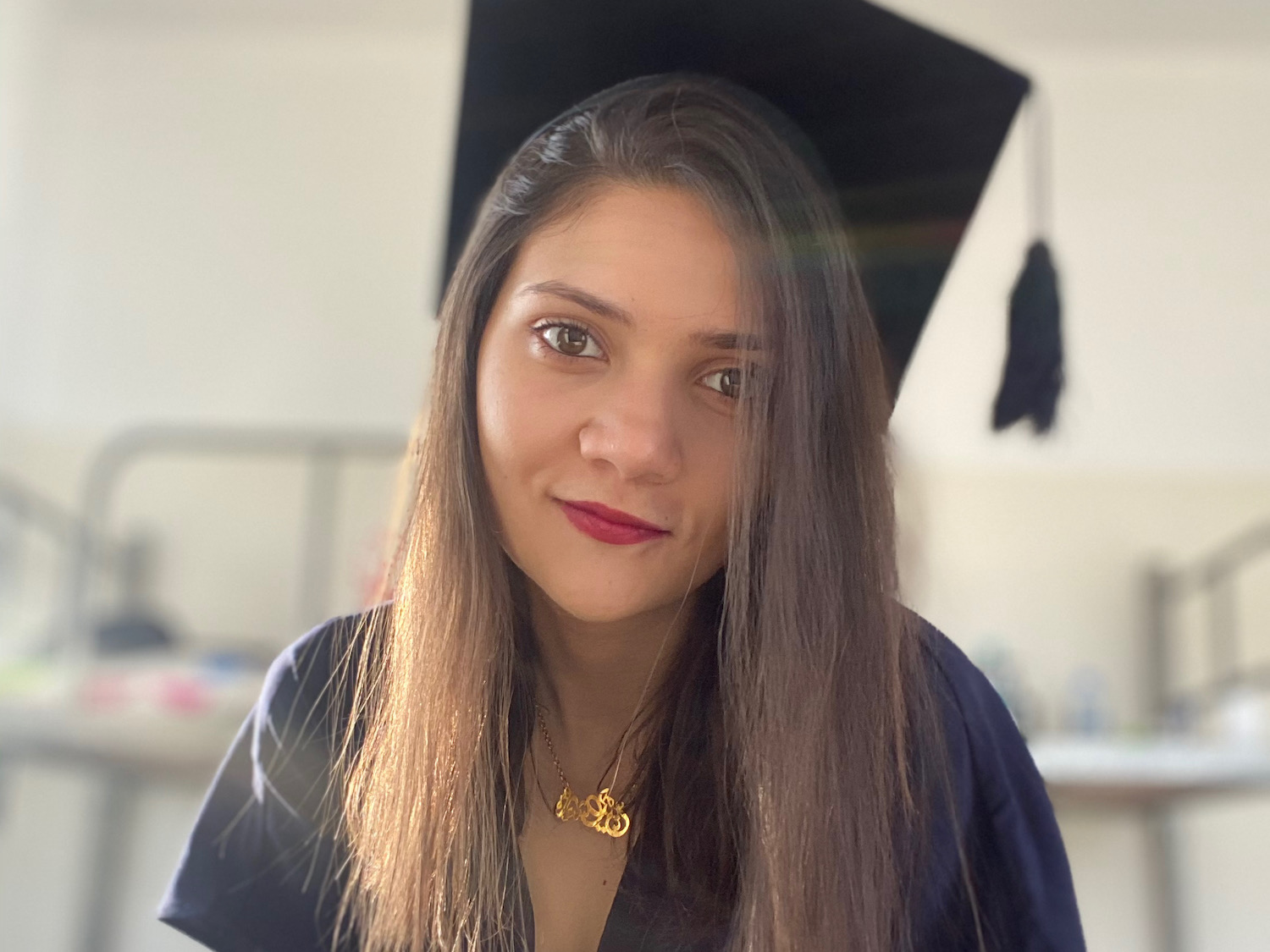
Tala Shurrab takes a photo of herself upon completing and submitting her undergraduate senior study while in quarantine at a health center in Gaza. (Photo courtesy of Tala Shurrab)
The spread of the novel coronavirus continues to claim thousands of lives worldwide, putting even the most advanced healthcare systems to the test. But while the pandemic may be an equal threat to all, it is far from affecting all communities equally.
We know that vulnerable groups — families sharing tight living quarters without clean water or sanitation, laborers who have been laid off and cannot afford enough food or health insurance, communities that have been crippled by years of state violence and neglect, among many others — have been hit much worse.
With that reality in mind, we wanted to hear from people across Israel-Palestine, and those in the diaspora, on how they are personally being affected by the pandemic. This is the second installment of those stories. If you would like to submit a diary entry, contact us at oped@972mag.com.
But my journey back has been far from what I had imagined.
May 21, 2020
I left Lebanon as soon as the COVID-19 outbreak there started to get worse, with only a 7-hour notice to pack up the past four years of my life into three suitcases. The plan was to return to Gaza directly, but the borders closed, and I had to wait in Jordan for two months, where I stayed with my grandmother and aunt.
I had to accept two sudden realities in that moment: that I would not be continuing my final semester with my friends in Lebanon, and that I would not be returning to Gaza for a while. I felt like a stranger, stuck between two homes that were out of reach. Nevertheless, I had no choice but to adapt, and I managed to do that by focusing on my studies.
Today, I was finally able to leave Jordan and start the journey back home. Together with 20 other Gazans, I boarded the bus at 8 a.m. Since it had been four years since I last experienced this long and emotional ride, I was uncertain and afraid of how we are going to be treated by the Israeli soldiers in particular.
We first crossed the Jordanian border, and then the same bus drove us to another crossing in Jericho. We seemed to be the only Palestinians traveling from Jordan back to Gaza, so everything went smoothly. We did not wait in any line or suffer mistreatment by anyone, which was an unusual experience for me. It felt like the threat of COVID-19 enriched people’s empathy. The border security officers were also taking all the necessary precautions, maintaining social distance and making sure they had gloves and masks on while interacting with us.
But no matter how many times I travel, I always fear the moment I must encounter Israeli soldiers. After being away for years, that emotion was even more intense.
Once we were done with these two crossings, we switched to another bus. It was then that I felt my journey back home was starting. Looking through the window at occupied Palestine is the closest I would probably ever get to visiting other Palestinian cities. Even though I was extremely exhausted and sleep deprived, my eyes were wide open, and it felt like I was creating a mental image of every road we passed by.
The 2-hour ride to the strip felt like an emotional rollercoaster. But the closer I got to the Gaza crossing, the more numb I felt, even after all this anticipation — especially since I knew I would be placed in quarantine for three weeks. Many questions and thoughts were racing through my mind. I was particularly afraid of arriving home only to realize that it does not feel like home anymore. Has home changed, or have I? I felt terrified of losing the only source of hope and strength I was holding onto in my years away. I was afraid that if I do not feel at home in Gaza anymore, my sense of purpose would fade away and I would be left with nothing but suffering.
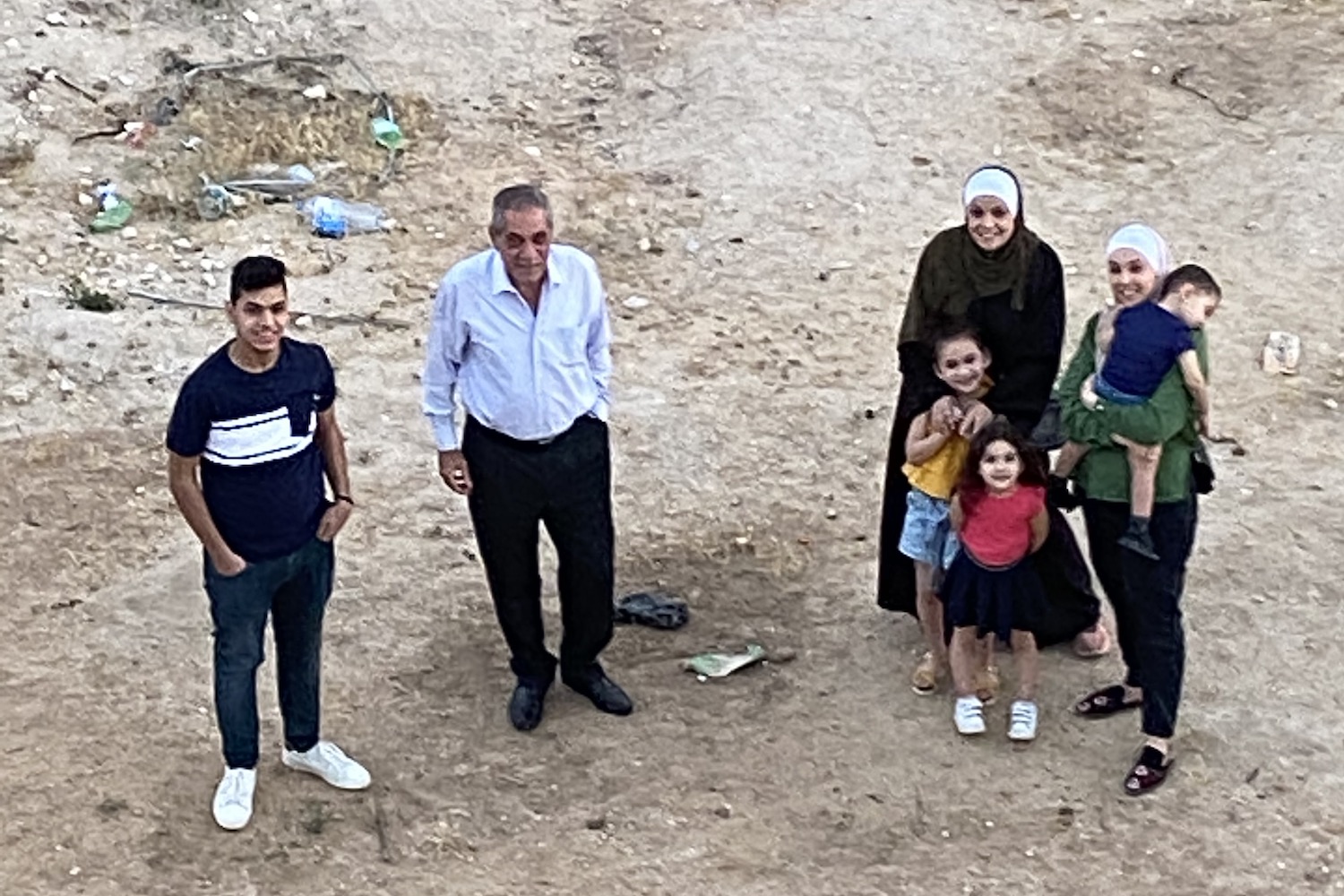
Even though my parents used to live in Cyprus and I could visit them there during my university years, I knew that seeing them in Gaza, where we made most of our memories as a family, would feel different. It would not feel like a visit anymore; I would finally feel like I belong. I would finally be living in a place where I do not feel like a stranger.We know that vulnerable groups — families sharing tight living quarters without clean water or sanitation, laborers who have been laid off and cannot afford enough food or health insurance, communities that have been crippled by years of state violence and neglect, among many others — have been hit much worse.
With that reality in mind, we wanted to hear from people across Israel-Palestine, and those in the diaspora, on how they are personally being affected by the pandemic. This is the second installment of those stories. If you would like to submit a diary entry, contact us at oped@972mag.com.
Tala Shurrab
GAZA — Four years ago, I left Gaza to pursue my undergraduate studies in psychology in Lebanon. I could not visit home in between semesters, given how challenging it is to travel to and from the strip. I have looked forward to the day I would finally come home, especially so that I can contribute my knowledge to better the lives of Palestinians in the strip.But my journey back has been far from what I had imagined.
May 21, 2020
I left Lebanon as soon as the COVID-19 outbreak there started to get worse, with only a 7-hour notice to pack up the past four years of my life into three suitcases. The plan was to return to Gaza directly, but the borders closed, and I had to wait in Jordan for two months, where I stayed with my grandmother and aunt.
I had to accept two sudden realities in that moment: that I would not be continuing my final semester with my friends in Lebanon, and that I would not be returning to Gaza for a while. I felt like a stranger, stuck between two homes that were out of reach. Nevertheless, I had no choice but to adapt, and I managed to do that by focusing on my studies.
Today, I was finally able to leave Jordan and start the journey back home. Together with 20 other Gazans, I boarded the bus at 8 a.m. Since it had been four years since I last experienced this long and emotional ride, I was uncertain and afraid of how we are going to be treated by the Israeli soldiers in particular.
We first crossed the Jordanian border, and then the same bus drove us to another crossing in Jericho. We seemed to be the only Palestinians traveling from Jordan back to Gaza, so everything went smoothly. We did not wait in any line or suffer mistreatment by anyone, which was an unusual experience for me. It felt like the threat of COVID-19 enriched people’s empathy. The border security officers were also taking all the necessary precautions, maintaining social distance and making sure they had gloves and masks on while interacting with us.
But no matter how many times I travel, I always fear the moment I must encounter Israeli soldiers. After being away for years, that emotion was even more intense.
Once we were done with these two crossings, we switched to another bus. It was then that I felt my journey back home was starting. Looking through the window at occupied Palestine is the closest I would probably ever get to visiting other Palestinian cities. Even though I was extremely exhausted and sleep deprived, my eyes were wide open, and it felt like I was creating a mental image of every road we passed by.
The 2-hour ride to the strip felt like an emotional rollercoaster. But the closer I got to the Gaza crossing, the more numb I felt, even after all this anticipation — especially since I knew I would be placed in quarantine for three weeks. Many questions and thoughts were racing through my mind. I was particularly afraid of arriving home only to realize that it does not feel like home anymore. Has home changed, or have I? I felt terrified of losing the only source of hope and strength I was holding onto in my years away. I was afraid that if I do not feel at home in Gaza anymore, my sense of purpose would fade away and I would be left with nothing but suffering.

I tried to comfort myself by saying that I would at least be placed in a decent quarantine facility, as my friends were when they arrived to Gaza yesterday. I expected to be in a room alone, both as a precautionary measure and for privacy purposes. As the bus drove us from the crossing, we were all still uncertain about “our quarantine place.” I was on the phone with my parents during the bus ride, anxiously asking them if they knew anything about where I would be sent. My parents were just as anxious and uncertain as I was.
A mere 15 minutes into the ride, the bus stopped. My heard began racing, my eyes on the verge of tears. We were dropped off at a new health center that is still under construction, located in the north, away from the city. I phoned my parents again, terrified of being placed here. The doctor who manages the center started calling us by our names. A few minutes later, he said my name. He asked about my age, whether I was a student and whether I was here alone. He then asked if I would like to share a room with the woman standing next to me in line. I suddenly broke down in tears in front of everyone at the center. I sobbed and screamed uncontrollably, saying that I will not be able to handle sharing a room or staying in this facility.
My reaction caused a scene; people there were looking at me strangely, surprised at how I responded to the situation. I did not care; I just could not handle too many changes at once. It felt like the whole experience was unreal. I was last in Gaza in 2016. I am not sure I was ready to deal with the reversed cultural shock in the comfort of my own home, let alone in the company of a stranger.
After speaking with the doctor who manages the center, I was transferred into my own room. I felt a sense of relief — until I got to the room. The space was small, with a single bunk-bed that looked uncomfortable and dirty. There was a pillow on the mattress, but no sheets. There were cockroaches flying in the room. I was also appalled to learn that the bathroom would still be shared with other women at the facility. I mean, the whole purpose of quarantine is for us to prevent the virus from spreading. Coming into contact with others — whether they are asymptomatic or not — defeats that purpose.
Everything is blurry and nothing makes sense. I feel like I’m hitting rock bottom, like all this strength I was holding onto all these years is crumbling. What if I jump out the window and escape? Surely running away is easier and safer than surviving this place.
But is it, really?
I’m exhausted.
May 22, 2020
I woke up feeling refreshed, calm, and positive after sleeping for 14 hours without interruption. I did not expect myself to bounce back, but I did. I tweeted a picture of my room and received so much love and support. My phone was bombarded with messages from family, friends, and strangers, and it oddly made me feel safe. It has really brought my strength back.
I am still trying to make sense of everything. Gaza is lacking equipment, and the people here are trying their best to combat the pandemic with the very few resources they have.
My parents can send me stuff that I need, and I can see them through the window. Seeing my family, even from a distance, brightened my day. The idea of seeing them will be how I convince myself to get out of bed in this 21-day isolation period. Quarantine under these conditions is only a small bump in the road and is a sacrifice that others and I are making for the safety of our community.
An older woman staying in the room right next to mine knocked on my door and asked how I was doing. She told me that I should consider her my mother here, since I am alone, and she will be more than glad to help me with anything I need. This warmed my heart.
I felt ashamed after causing a scene last night. I was afraid that the staff and other residents would avoid speaking to me. But the opposite happened: nobody brought it up, and neither did I. The staff here greeted everyone very warmly. They brought us bathroom essentials and room necessities, like bed sheets and toilet paper.
I have two days to submit my undergraduate senior study, and I am struggling with the very slow internet. I can barely keep one tab working.
May 23, 2020
I filed my senior study early. I felt like I needed to accomplish something as soon as possible so I can feel positive and relieved.
I celebrated myself afterward. My parents came to see me along with my relatives. My aunt sent me a precious gift: a Palestinian coin that dates back to 1942. My parents sent me my favorite snacks, and my mother made me my favorite homemade pizza of all time! My cousins sent me letters, a handmade mug, and a graduation cap. My friends called to congratulate me. It felt like a real celebration.
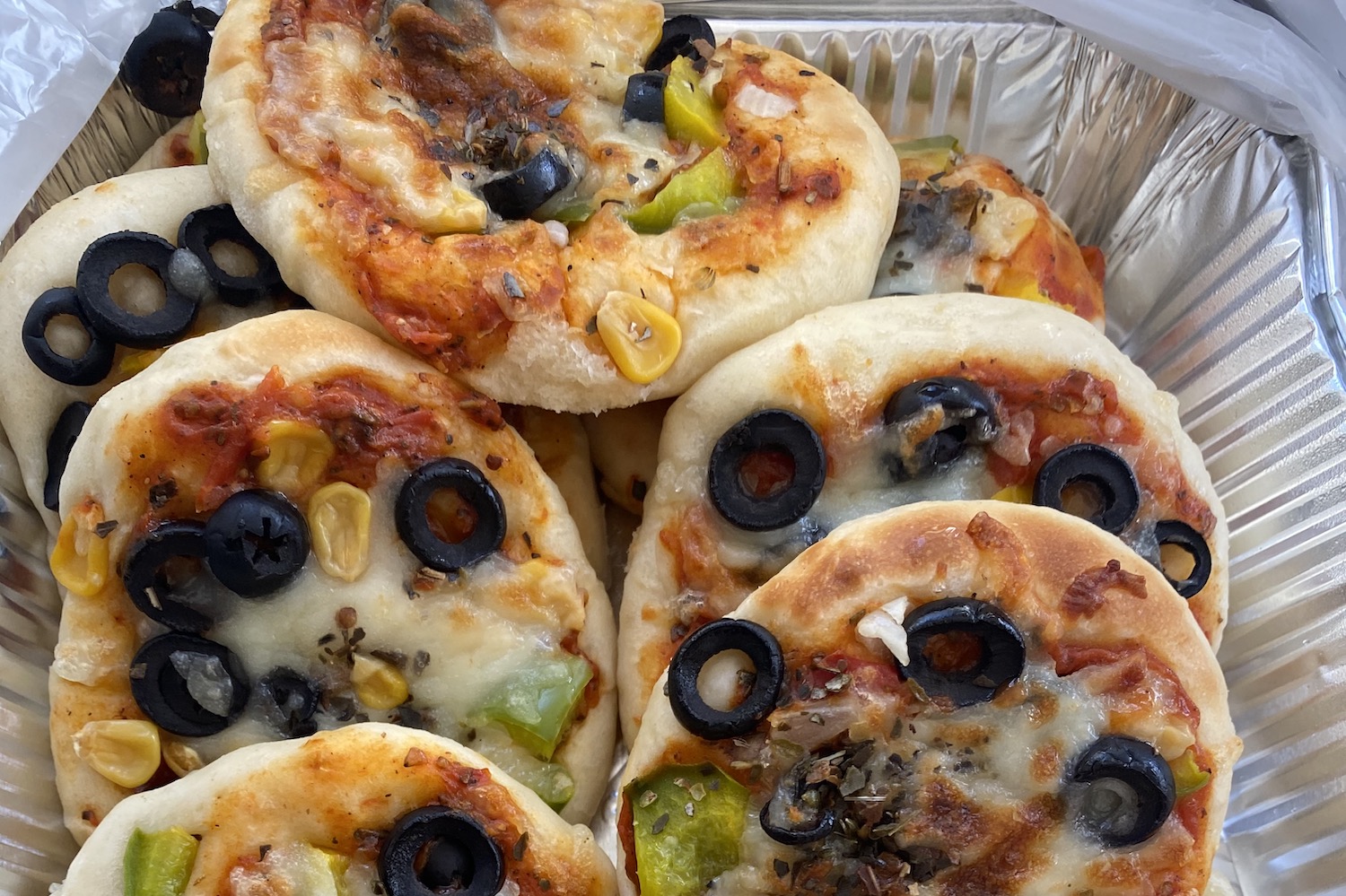
May 24, 2020
It is the first day of Eid ul-Fitr, and I decided to dress up. My plan in quarantine is to do something new every day. So, while my loved ones celebrated me yesterday, today I am celebrating myself. I took pictures, played music, enjoyed my pizza and chocolate, and sipped on coffee afterward.
A celebration without the people I love is not complete, though. My family came to visit again, and my friends and I attempted to video call. Things did not go exactly as planned, though, because of the slow internet connection. Instead, I bombarded them with pictures and voice notes on WhatsApp. It is okay, I am learning to be patient here.
I am quickly adapting to this new quarantine reality. I am being patient and mindful. People here are nice and very understanding. The staff brings us three meals a day and make sure we have everything we need. There is a doctor who stays in the center and checks up on us daily. The most important thing is to stay in our rooms and not interact with people unless we wear our masks and keep a safe distance.
I met some of the women on my floor and exchanged small conversations with them. I am the only student here; most of them are mothers over 30. I finally felt like I was in my home country again. The humility, hospitality, care, and love they have for each other — regardless of whether they previously knew one another or not — is fascinating to me. It feels amazing the way people support each other here. This is exactly what I had missed while I was away.
May 25 and May 26, 2020
Eid in isolation was not bad at all. My family visited me each day, brought me ka’ek (cookies), chocolate, and gifts. It has been four years since I tasted my mother’s ka’ek, which was a part of Eid I always looked forward to. My friends from abroad sent me videos of them wishing me a happy holiday. All of this made me feel like I belong somewhere, and that I am loved even though I am physically not able to be with them.
By now, I have perfected my daily quarantine routine: I sleep at 7 a.m. and wake up at 4 p.m. (I was never a morning person and now, with the slow internet and isolation, I’ve decided to kill time by sleeping through it). However, it became part of the routine to interrupt my sleep with a knock on the door from the doctor, coming to check my temperature and make sure I am well. I then sleep a bit longer, and wake up to have coffee with chocolate, then tidy up the room. I take a hot shower, which always relaxes me, even though the shower is basically the sink.
At around 7 p.m., my family visits me. There are newcomers each day: cousins, aunts, uncles and friends. After I have my dinner, my best friend, who lives in Bethlehem, keeps me company for the night. We have movie nights together and talk for hours, laughing and joking. We always discuss how ironic it is to be in the same country and not be able to visit each other because of the siege.
When the Wi-Fi connection is not fast enough to pass time by streaming movies and series, I journal and reflect on my thoughts, call my family and friends, and sometimes read. On my third day here, a dear friend gifted me “The Idiot Brain” by Dean Burnett and “The Da Vinci Code” by Dan Brown.
Sometimes I also catch myself doing absolutely nothing, just lying in bed and thinking about my plans after I get out. I imagine my reaction and feelings when I would finally meet my loved ones here. I have a 7-year-old cousin who was only 3 when I left the strip. I used to babysit her and spent most of my senior year of high school with her. I am eagerly looking forward to seeing her again, especially now that I can actually have a conversation with her. She calls me every day to entertain me and says she is counting down the days till our reunion.
When I imagine getting out of quarantine, I see my family and cousins waiting for me outside. I imagine hugging them, and it makes me tear up with joy. I cannot wait till this happens in person! Just imagining this already makes the wait easier.
I do not like to count how many days are left. Rather, I count how many days have passed — it is reassuring for me to look back and reflect on how much I have changed since I first arrived, when I thought I would not be able to survive even a single day here.
May 27, 2020
I am enjoying the little things now — even the things that used to make me angry on a normal day. I hand-washed my clothes for the first time today, and accidentally spilled water all over the room’s floor in the process. I smiled and said to myself that I now have more activities to fill my day with, and that I am going to enjoy wiping up the floor. This reaction took me by surprise; had this happened to me in the comfort of my own home, I am sure I would have lost my mind and probably yelled at the water.
May 28, 2020
Today was full of highlights. My parents visited me as usual, but this time with my young cousins. I felt like I was on top of the world when I saw my 7-year-old cousin. Even though there is a whole building separating us, she was smiling and screaming “I love you, Tala! I will be seeing you soon,” and “I want to buy you a gift. What is your favorite shoe brand?”
This melted my heart. I know that I am quarantined for a purpose, and that is to keep my family safe, including my beloved cousin.
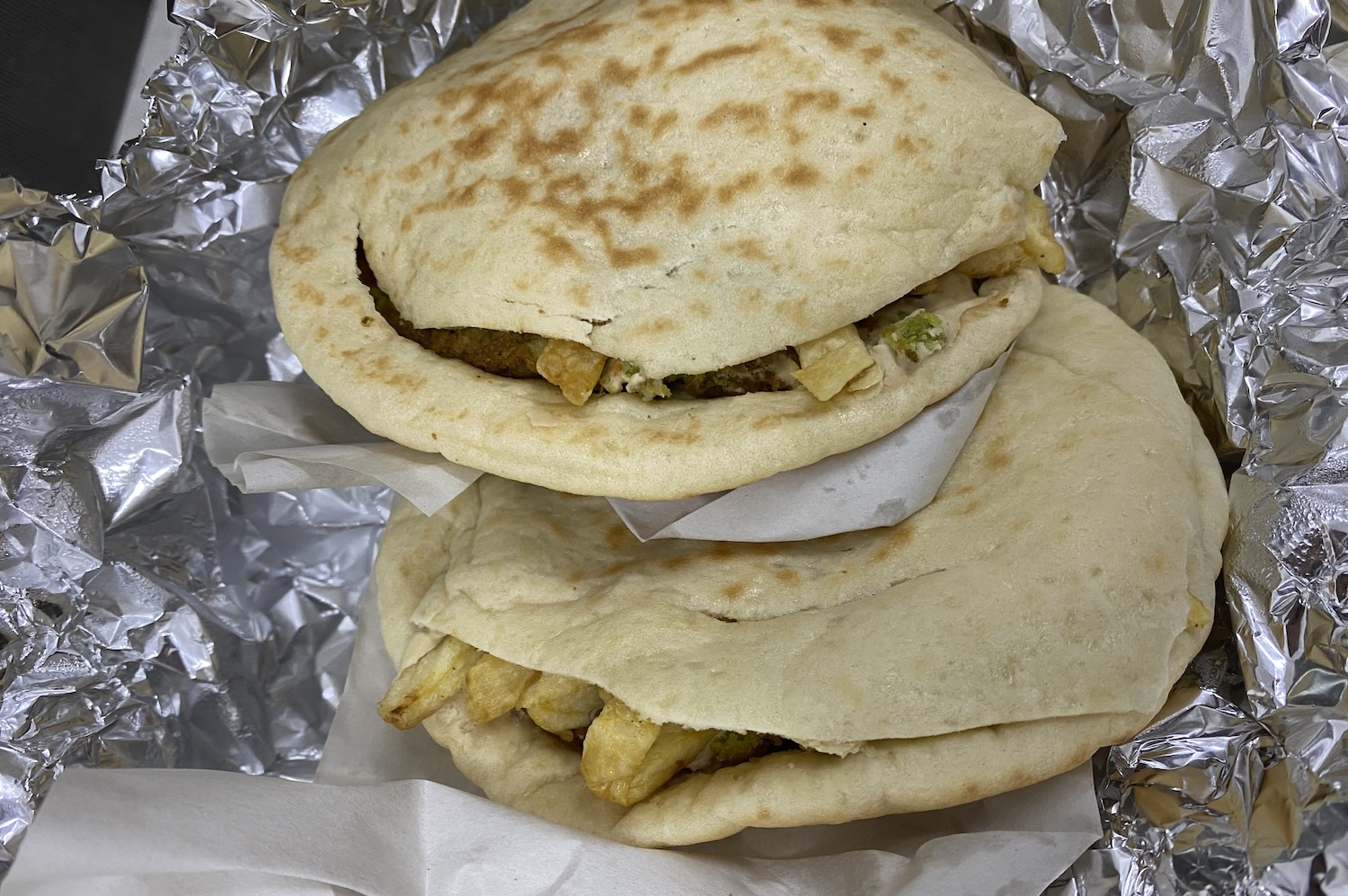
The second surprise was that my parents brought me falafel — my favorite traditional food in Gaza. When I was in the strip, I used to have falafel for breakfast, lunch and dinner without getting bored of it. Today, I finally enjoyed that again. I savored every bite of these two falafel sandwiches. I am feeling home in isolation through the simplest things.
May 30, 2020
I am officially done with my BA. I received my final grade while in bed. I graduated with high distinction and a GPA that I had set to accomplish in my freshman year. I felt accomplished and wanted to make this day special.
The ways to celebrate in quarantine are few, yet seeing my family from the window again today felt special. I could barely fight the urge to jump out and hug my parents, who were in tears of joy and pride when they saw me. I have made them proud and that was my celebration; it was enough for me to enjoy the rest of my day.
June 3, 2020
It is my dad’s birthday today and he wanted to start it off by seeing me. He and my mom came to visit me at around 11:30 p.m., so he would turn 61 in my company. I sang him Happy Birthday and he said that he will be waiting to celebrate both his birthday and my graduation together. It was so hard for me to just stand there and not be able to properly celebrate him. I wanted to hug him and have a deep conversation like the good old days. But I did not want to drown in my own thoughts and all the what-ifs. So, I picked up the phone after he left and video-called him. Luckily the Wi-Fi was not so bad and we spoke for almost an hour. It is definitely feeling like home by the day.
Despite its consequences, quarantine has made me realize how grateful I am for the things I used to take for granted, like simply being able to see my family, having homemade food, and, certainly, having a private bathroom!
This experience has not been easy at all. Some days seem to pass by quickly while others feel like years. There were days that I just wished I could run away with my family when they would visit. There are others where I could barely get myself out of the bed.
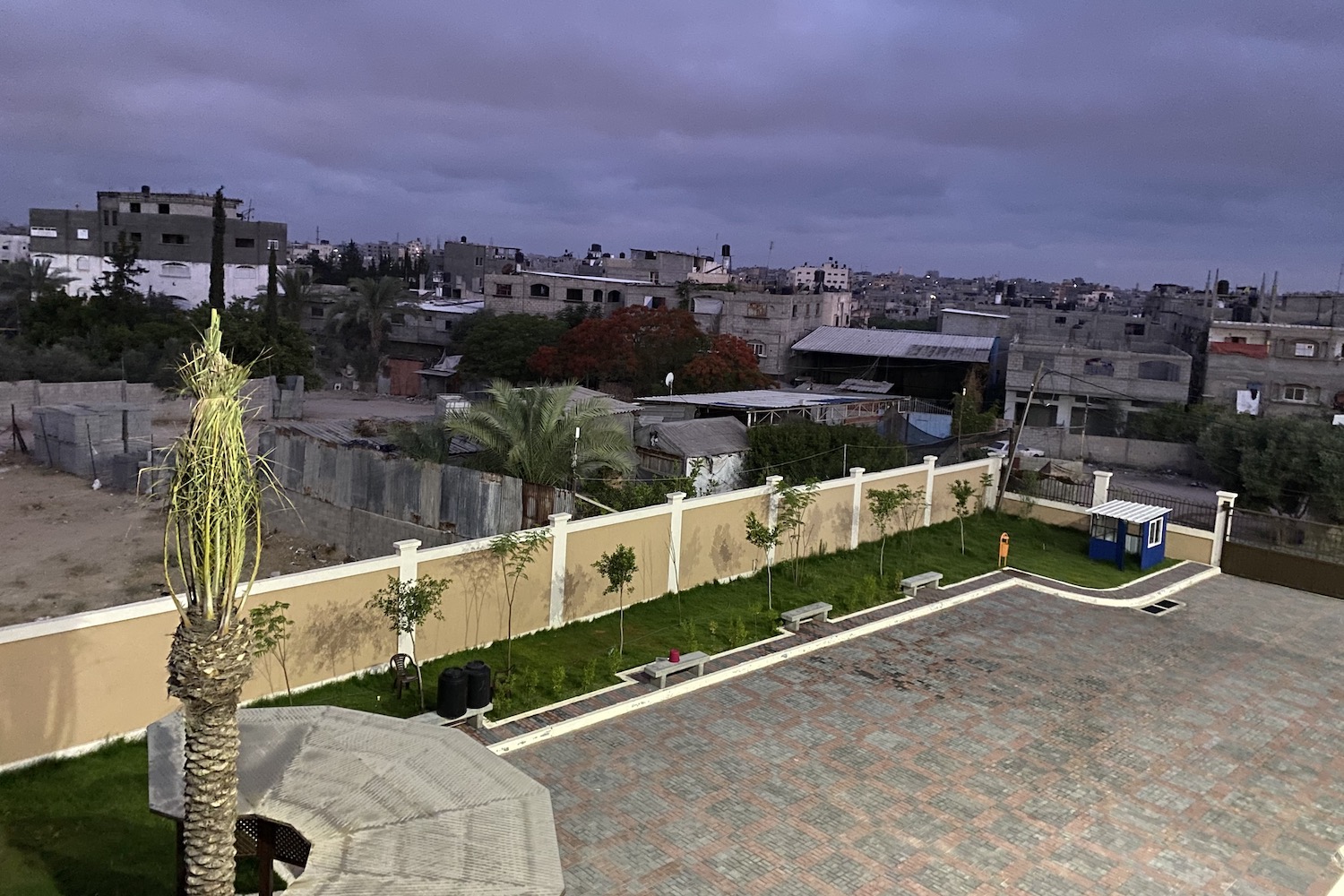
I try to put myself back on track by reminding myself of why it is my duty toward my community to do this. Gaza cannot handle a coronavirus outbreak, and so our quarantine period here is longer than usual. We do not have enough test kits, masks and gloves to contain the virus were it to break out inside Gaza City. That is why we need to fight harder than other countries.
I feel so proud of how the medical staff and the volunteers are handling the situation here. They are taking all the necessary precautions in the quarantine facilities, making sure to wear gloves and masks when interacting with us, handing us masks if we need to get out of our rooms, and having a doctor staying in the same facility to make sure everything is under control. Being here reminded me of how friendly and helpful the people in Gaza are, and how heartwarming the hospitality here is. The staff even created a WhatsApp group for everyone at the center to get to know each other and share any concerns with the staff and the doctor.


No comments:
Post a Comment
Note: only a member of this blog may post a comment.